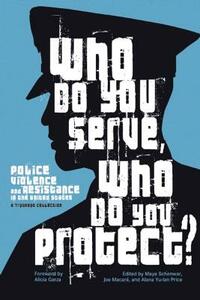Take a photo of a barcode or cover
141 reviews for:
Who Do You Serve, Who Do You Protect?: Police Violence and Resistance in the United States
Maya Schenwar
141 reviews for:
Who Do You Serve, Who Do You Protect?: Police Violence and Resistance in the United States
Maya Schenwar
challenging
informative
reflective
medium-paced
dark
emotional
hopeful
informative
inspiring
reflective
sad
tense
medium-paced
this book was packed with information and refrences to examples upon examples of police brutality and the horrors of the criminal justice system. if you are someone who wants links to sources for each specific example, this book will not disappoint. I also really loved the second half of this book where it offered alternative solutions to policing and prisons. its really motivated me to start learning more about what we can do now to start working towards a world without prisons.
Nice compilation from people who have been doing the research and the work on community policing and the fight for Black lives. It is both honest and informative about the things that need to change and how we seek that change.
An important anthology of work from reporters and activists about movements for Black lives and abolishing police states. The various perspectives, data, anecdotes, analyses, and calls-to-action overview the U.S.'s historically racist and violent systems of policing and beckon readers to imagine transformative notions of safety and justice.
E-book available for free download at this link!
https://www.haymarketbooks.org/books/952-who-do-you-serve-who-do-you-protect
A few quotes:
“The conflict that has driven history in the New World is Black people’s struggle to hold onto their humanity against a culture that objectifies them as property” (N. Powers).
“Slavery built modern capitalism and enriched a vast network of slaveholders, stock traders, banks and corporations. Slaveholders’ number one fear was slave rebellion, since that would disrupt or collapse the system. Thus, terrorizing slaves through torture and other violence was a way to control them, prevent insurrection and uphold the slave-built economic system" (A. Hudson).
“According to FBI data, a white police officer kills a Black person almost twice a week” (A. Hudson).
“Police officers who brutalize Black and Brown people often try to protect themselves from scrutiny or reprimand by charging their victims with felonies afterward. In court, district attorneys then offer to reduce the charges against victims of brutality to misdemeanors, permitting them to plead guilty and walk away with no time or time served. After the victims plead guilty rather than face the possibility of many years in prison, the officers who beat them incur virtually no risk of being brought up on charges or losing in the event of a lawsuit" (R. Rodriguez).
“The African diaspora is everywhere, and we are complex. Our range of responses to anti-Blackness should mirror our existence" (W. C. Anderson).
“Most importantly, it will push us beyond police reform to a radical reimagination of public safety. When we begin to understand that police are a significant source of violence against women and LGBTQ people of color—even as they are promoted as our protectors—we must question whether countering police violence is really a question of dealing with a few “bad apples” or problematic policies. Challenging police violence requires a challenge to the institutional structure itself, which is deeply rooted in policing the boundaries of race, gender, sexuality, poverty and nation. Going forward, our charge is not only to protest the killings, demand policy changes and call for accountability but also to nurture values and structures that will truly produce safety for all of us" (A. J. Ritchie).
" 'Pregnant women are viewed as deserving of this kind of violence. Women are brutally arrested, shackled, placed in solitary confinement and threatened with violence.' But, she is quick to add, arrests can lead to violence which is less visible yet no less damaging. 'The coercion to end your pregnancy or to give up your medical privacy because of the risk of having your child taken from you, all of these things basically force women’s cooperation to something that they don’t really consent to. This is coerced, whether you want to call it police violence or medical violence or both' "(K. Hayes).
“Police officers are all individuals, and it’s impossible to say that they are all bad at their jobs. However, police have all sworn to uphold laws that systematically disenfranchise marginalized and working people for the benefit of the rich and powerful" (M Ludwig).
"Transformative justice and community accountability are terms that describe ways to address violence without relying upon police or prisons. These approaches often work to prevent violence, to intervene when harm is occurring, to hold people accountable, and to transform individuals and society to build safer communities. These strategies are some of the only options that marginalized communities have for addressing harm" (E. Dixon).
E-book available for free download at this link!
https://www.haymarketbooks.org/books/952-who-do-you-serve-who-do-you-protect
A few quotes:
“The conflict that has driven history in the New World is Black people’s struggle to hold onto their humanity against a culture that objectifies them as property” (N. Powers).
“Slavery built modern capitalism and enriched a vast network of slaveholders, stock traders, banks and corporations. Slaveholders’ number one fear was slave rebellion, since that would disrupt or collapse the system. Thus, terrorizing slaves through torture and other violence was a way to control them, prevent insurrection and uphold the slave-built economic system" (A. Hudson).
“According to FBI data, a white police officer kills a Black person almost twice a week” (A. Hudson).
“Police officers who brutalize Black and Brown people often try to protect themselves from scrutiny or reprimand by charging their victims with felonies afterward. In court, district attorneys then offer to reduce the charges against victims of brutality to misdemeanors, permitting them to plead guilty and walk away with no time or time served. After the victims plead guilty rather than face the possibility of many years in prison, the officers who beat them incur virtually no risk of being brought up on charges or losing in the event of a lawsuit" (R. Rodriguez).
“The African diaspora is everywhere, and we are complex. Our range of responses to anti-Blackness should mirror our existence" (W. C. Anderson).
“Most importantly, it will push us beyond police reform to a radical reimagination of public safety. When we begin to understand that police are a significant source of violence against women and LGBTQ people of color—even as they are promoted as our protectors—we must question whether countering police violence is really a question of dealing with a few “bad apples” or problematic policies. Challenging police violence requires a challenge to the institutional structure itself, which is deeply rooted in policing the boundaries of race, gender, sexuality, poverty and nation. Going forward, our charge is not only to protest the killings, demand policy changes and call for accountability but also to nurture values and structures that will truly produce safety for all of us" (A. J. Ritchie).
" 'Pregnant women are viewed as deserving of this kind of violence. Women are brutally arrested, shackled, placed in solitary confinement and threatened with violence.' But, she is quick to add, arrests can lead to violence which is less visible yet no less damaging. 'The coercion to end your pregnancy or to give up your medical privacy because of the risk of having your child taken from you, all of these things basically force women’s cooperation to something that they don’t really consent to. This is coerced, whether you want to call it police violence or medical violence or both' "(K. Hayes).
“Police officers are all individuals, and it’s impossible to say that they are all bad at their jobs. However, police have all sworn to uphold laws that systematically disenfranchise marginalized and working people for the benefit of the rich and powerful" (M Ludwig).
"Transformative justice and community accountability are terms that describe ways to address violence without relying upon police or prisons. These approaches often work to prevent violence, to intervene when harm is occurring, to hold people accountable, and to transform individuals and society to build safer communities. These strategies are some of the only options that marginalized communities have for addressing harm" (E. Dixon).
This is a collection of ‘essays’ (really articles) about police brutality. Like any collection, some are stronger than others. A common issue was trying to cover too big of a topic in a handful of pages. Some probably would have been better as full books with enough pages to give justice to their topic. The most successful were specific and/or personal topics. I would probably recommend [b:The End of Policing|35403039|The End of Policing|Alex S. Vitale|https://i.gr-assets.com/images/S/compressed.photo.goodreads.com/books/1595622877l/35403039._SY75_.jpg|56772861] over this. But this is still definitely worth a read. It’s pretty easy to fly through since all the essays are short.
Favorites:
“Killing the Future: The Theft of Black Life”
“Ring of Snitches: How Detroit Police Slapped False Murder Convictions on Young Black Men”
“Your Pregnancy May Subject You to Even More Law Enforcement Violence”
“Our History and Our Dreams: Building Black and Native Solidarity”
Favorites:
“Killing the Future: The Theft of Black Life”
“Ring of Snitches: How Detroit Police Slapped False Murder Convictions on Young Black Men”
“Your Pregnancy May Subject You to Even More Law Enforcement Violence”
“Our History and Our Dreams: Building Black and Native Solidarity”
This book taught me a lot and make me think about and ask myself some serious questions. However, as each chapter was written by a different person a lot of it was repetitive, especially towards the end.
This is a good primer on the topic. It does feel somewhat dated to 2024 eyes. But still, a decent starting place.
Intesting books with a lot of great points but I truly despise the term "black bodies" instead of "black people", it sounds incredibly dishumanizing to me, and I wish it would have more chapters dedicated to the abuse Black girls and women face.
A really excellent collection of pieces by community organizers who have been doing work to advance healthier + safer + more just alternatives to policing, since way before it was trendy. It was really encouraging to read about practical solutions and real communities.




